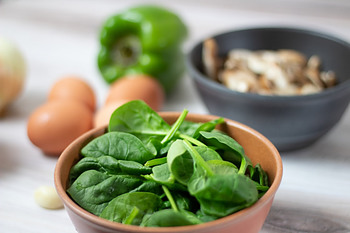Is Spinach Healthy?

Do you love spinach? I love to mix is up with jasmine rice or serve with my scrambled eggs. There are some great health benefits to eating healthy spinach. This post will talk all about spinach and answer the important question is spinach healthy?
Is Spinach really a healthy Superfood?
The term “superfood” is not a scientifically defined or regulated term, but it is often used to describe foods that are particularly nutrient-dense and provide various health benefits. In that context, spinach is often considered a superfood due to its impressive nutritional profile. Spinach in organic form is the ideal way to buy. Here are some reasons why spinach is often referred to as a healthy superfood:
- Nutrient Density: Spinach is packed with a wide array of essential nutrients, including vitamins (A, C, E, K, and various B vitamins), minerals (iron, calcium, potassium, and magnesium), and antioxidants. These nutrients are important for overall health, supporting various bodily functions.
- Antioxidant Content: Spinach is rich in antioxidants like beta-carotene, lutein, and zeaxanthin. Antioxidants help protect the body against cellular damage caused by free radicals, which can contribute to chronic diseases and aging.
- Health Benefits: Spinach has been associated with several health benefits. Its high antioxidant content may help reduce the risk of chronic diseases, such as heart disease, certain cancers, and age-related macular degeneration. The fiber in spinach supports healthy digestion, and its low-calorie content makes it beneficial for weight management.
- Versatility: Spinach is a versatile vegetable that can be easily incorporated into various dishes, such as salads, smoothies, sautés, and soups. Its mild flavor and tender texture make it appealing to many people.
While spinach is undoubtedly a highly nutritious food, it’s important to note that a balanced and varied diet is key to overall health. No single food can provide all the necessary nutrients, so it’s recommended to consume a variety of fruits, vegetables, whole grains, lean proteins, and healthy fats for optimal nutrition.
All forms of spinach are healthy, offering benefits such as vitamins A and C, iron, and calcium, so the “healthiest” spinach is the one you will eat regularly. Both baby and mature spinach provide the same core nutrients, though baby spinach is tenderer and better for raw consumption in salads, while mature spinach is more suited to cooking. For peak freshness and nutrient content, choose freshly harvested spinach, ideally consumed soon after purchase, or frozen spinach, which is often processed at its peak and can retain high nutrient levels.
Is Spinach healthier fresh or cooked?
Both fresh and cooked spinach have their own set of nutritional benefits, but the cooking process can affect certain nutrients. Here are some points to consider:
Fresh Spinach:
- Nutrient Retention: Fresh spinach retains its vitamin C and folate content, which can be reduced during the cooking process.
- Antioxidant Content: Fresh spinach contains higher levels of antioxidants like vitamin C and lutein, which may be partially degraded by heat.
- Fiber: Fresh spinach is a good source of dietary fiber, which remains intact whether consumed raw or cooked.
Cooked Spinach:
- Increased Nutrient Absorption: Cooking spinach can enhance the bioavailability of certain nutrients, such as beta-carotene and iron, making them easier for the body to absorb.
- Reduced Oxalate Content: Cooking spinach significantly reduces its oxalate content, which can be beneficial for individuals prone to kidney stones or with certain medical conditions.
- Calcium Availability: Cooking spinach can help release calcium from its oxalate complexes, making it more available for absorption.
Ultimately, the choice between fresh and cooked spinach depends on personal preference and specific dietary needs. Incorporating a variety of both raw and cooked vegetables into your diet can ensure a balanced intake of nutrients.

Is it OK to eat Spinach every day?
Eating spinach every day can be a part of a healthy diet for most individuals. Spinach is highly nutritious and packed with essential vitamins, minerals, and antioxidants. It is a good source of vitamin A, vitamin C, vitamin K, folate, iron, and fiber.
However, it’s important to note that some people may have specific dietary requirements or medical conditions that could influence their spinach consumption. For example, individuals with certain medical conditions, such as kidney stones or certain types of kidney disease, may need to limit their intake of foods high in oxalate, including spinach. Additionally, people taking blood-thinning medications may need to be cautious with their vitamin K intake, as spinach is relatively high in this nutrient.
As with any food, moderation is key. A varied and balanced diet that includes a wide range of fruits, vegetables, whole grains, lean proteins, and healthy fats is generally recommended for overall health. If you have specific concerns or dietary restrictions, it’s always a good idea to consult with a healthcare professional or registered dietitian for personalized advice.

Are Baby Spinach and Spinach the same?
Yes, baby spinach and regular spinach are essentially the same leafy vegetable, but they differ in terms of their size and maturity. Baby spinach refers to young spinach leaves that are harvested when they are smaller and more tender, typically around 15 to 30 days old. These young leaves have a delicate texture and a milder flavor compared to mature spinach.
Regular or mature spinach, on the other hand, is allowed to grow longer before being harvested. The leaves are larger and have a slightly stronger taste. Mature spinach can be cooked or used in salads, just like baby spinach.
In terms of nutritional value, both baby spinach and mature spinach offer similar health benefits. They are rich in vitamins, minerals, fiber, and antioxidants, and are low in calories. Whether you choose baby spinach or regular spinach depends on personal preference and the specific recipe or dish you plan to prepare. Looking for a so so healthy recipe with spinach? Try this recipe for tasty spanakopita spinach pie. Or this recipe for mini spinach lasagna rollups.

Is Spinach Healthy?
Yes, spinach is considered a highly nutritious and healthy food. It is low in calories and carbohydrates but packed with essential vitamins, minerals, and antioxidants. Here are some reasons why spinach is considered healthy:
- Nutrient-Rich: Spinach is rich in vitamins A, C, E, and K. It also contains a range of B vitamins, including folate. These vitamins play important roles in maintaining overall health and supporting various bodily functions.
- Minerals: Spinach is a good source of minerals such as iron, calcium, potassium, and magnesium. Iron is essential for oxygen transport and energy production, while calcium is important for bone health. Potassium and magnesium are necessary for maintaining proper muscle and nerve function.
- Antioxidants: Spinach is abundant in antioxidants like beta-carotene, lutein, and zeaxanthin. These compounds help protect the body against damage caused by free radicals, which are unstable molecules that can contribute to chronic diseases.
- Fiber: Spinach contains dietary fiber, which aids in digestion, promotes satiety, and helps maintain healthy cholesterol and blood sugar levels.
- Versatile and Low in Calories: Spinach is a versatile vegetable that can be incorporated into various dishes such as salads, smoothies, stir-fries, and soups. It is low in calories, making it a great choice for those watching their weight or aiming to maintain a balanced diet.
Overall, spinach is a nutrient-dense food that can provide numerous health benefits when included as part of a well-rounded diet. I hope this article has helped you understand more about spinach and is spinach healthy?





